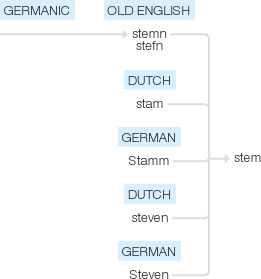Stem
Old English stemn, stefn, of Germanic origin; related to Dutch stam and German Stamm . stem1 (sense 4 of the noun) is related to Dutch steven, German Steven .
wiktionary
From Middle English stem, stemme, stempne, stevin, from Old English stemn, from Proto-Germanic *stamniz, ultimately from Proto-Indo-European *steh₂-(“to stand, stay”).
From Middle English stemmen, a borrowing from Old Norse stemma(“to stop, stem, dam”) (whence Danish stemme/ stæmme(“to stem, dam up”)), from Proto-Germanic *stammijaną. Cognate with German stemmen, Middle Dutch stemmen, stempen. Compare stammer.
stem (plural stems)
Acronym of science, technology, engineering, (and) mathematics.
etymonline
stem (n.)
Old English stemn, stefn "stem of a plant, trunk of a tree," also "either end-post of a ship," from Proto-Germanic *stamniz (source also of Old Saxon stamm, Old Norse stafn "stem of a ship;" Danish stamme, Swedish stam "trunk of a tree;" Old High German stam, German Stamm), from suffixed form of PIE root *sta- "to stand, make or be firm."
Meaning "support of a wineglass" is from 1835. Meaning "unchanging part of a word" is from 1830. Stems slang for "legs" is from 1860. The nautical sense is preserved in the phrase stem to stern "along the full length" (of a ship), attested from 1620s. Stem cell attested by 1885.
stem (v.1)
"to hold back," early 14c., from a Scandinavian source, such as Old Norse stemma "to stop, dam up; be stopped, abate," from Proto-Germanic *stamjan (source also of Swedish stämma, Old Saxon stemmian, Middle Dutch stemon, German stemmen "stop, resist, oppose"), from PIE root *stem- "to strike against something" (source also of Lithuanian stumiu, stumti "thrust, push"). Not connected to stem (n.). Related: Stemmed; stemming. Phrase to stem the tide is literally "to hold back the tide," but often is confused with stem (v.2) "make headway against."
Verbal phrase stems from (1932, American English), perhaps is from stem (v.) in the sense "to rise, mount up, have origin in" (1570s), or is influenced by or translates German stammen aus, probably from a figurative sense represented by English stem (n.) in the sense of "stock of a family, line of descent" (c. 1540; compare family tree, and German stammvater "tribal ancestor," literally "stem-father").
stem (v.2)
"make headway by sailing, head in a certain course," late 14c., literally "to push the stem through," from stem (n.) in the "ship post" sense (here the post at the prow of the ship). Related: Stemmed; stemming.
